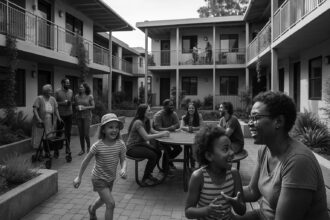Channel 4’s new series Virgin Island offers a provocative look at how sexual surrogacy and therapeutic touch aim to help anxious adults overcome intimacy challenges, amid a growing ‘sex recession’ and shifting social attitudes towards relationship and consent.
The new Channel 4 series Virgin Island aims to navigate the delicate terrains of intimacy, self-confidence, and sexuality through the lens of a therapeutic retreat. Set on a picturesque Croatian island, the programme invites twelve adults—dubbed ‘the virgins’—to confront their anxieties surrounding sex and touch, culminating in a unique form of therapy that has sparked considerable discussion and debate.
Participants in the show arrive with a variety of issues, including deep-seated insecurity, bullying experiences, and general apprehension about physical intimacy. These struggles are not isolated; they reflect a broader trend often referred to as the “sex recession.” A study conducted by University College London revealed that one in eight 26-year-olds in England had not engaged in sexual activity, despite a culture saturated with sexual imagery thanks to social media and platforms like OnlyFans.
At the heart of Virgin Island is a group of licensed sex therapists, including sexual surrogates who employ “hands-on” methods to facilitate healing and intimacy. This approach raises ethical questions, as the traditional client-therapist relationship discourages physical intimacy for various reasons, including the potential for exploitative dynamics. Sexual surrogacy diverges from this norm by incorporating touch and sexual experiences as therapeutic tools, specifically aimed at clients who are often unable to engage in sexual contact due to trauma, anxiety, or other underlying issues.
Vincent Armand, a sexual surrogate with two decades of experience, describes his role as one that goes beyond mere sexual service. “I work a lot with what I call the ‘novice and nervous’—people who are very fearful, or who haven’t had the experience to try something they want in a safe environment,” he explains. As a former psychiatric nurse, Armand bridges the gap between mental health and sexual health, a connection that is vital when addressing clients’ fears and sensitivities. He emphasises a nurturing approach, stating, “Sometimes the work I do amounts to no more than handholding.”
While the concept of sexual surrogacy has gained some mainstream recognition—partly due to films like The Sessions, which dramatise the therapeutic process through surrogate partners—the legal and ethical landscape remains complex. In the UK, sexual surrogacy is not illegal, but professional organisations such as the College of Sexual and Relationship Therapists advise against it, citing concerns over consent, boundaries, and the therapeutic relationship’s integrity.
The programme attempts to showcase the gentle progress that can be made in a therapeutic setting, yet the fast-paced nature of television inevitably creates a different dynamic. Despite the show’s constraints, the core idea remains: fostering a safe space where those with limited experiences can find healing through intimacy. As one participant aptly noted, watching the therapy unfold is akin to experiencing an excruciatingly awkward sex scene with one’s parents.
The discussion surrounding Virgin Island and sexual surrogacy is layered with societal implications, particularly regarding individuals with disabilities. Many of Armand’s clients include those who are disabled and seek assistance to experience intimacy, reinforcing the perspective that sexual health is a fundamental human right. The TLC Trust, an organisation that helps disabled individuals access sexual services, underscores the need for responsible practice in this sensitive area.
As the participants of Virgin Island engage in their journey—working towards comfort with sexual intimacy—viewers are left pondering the lasting impact of such experiences. Will this new form of therapy provide them the tools to navigate intimacy in their futures? The unfolding narrative aims to reveal not just the struggles faced by these individuals, but also the transformative potential of fully-fledged, compassionate care in the sexual realm.
Though the series confronts uncomfortable realities, it also invites broader questions about relationships, consent, and the many ways society understands intimacy as it continues to evolve.
As the social backdrop shifts, viewers remain curious about the long-term effects of this unprecedented approach to healing and intimacy, both on screen and beyond.
Reference Map
- Paragraphs 1, 2, 3, 4, 5, 6, 7, 8, 9
Source: Noah Wire Services
- https://www.independent.co.uk/life-style/virgin-island-what-is-sexual-surrogate-sex-b2750214.html – Please view link – unable to able to access data
- https://www.independent.co.uk/life-style/virgin-island-what-is-sexual-surrogate-sex-b2750214.html – An article discussing Channel 4’s ‘Virgin Island’ series, which follows 12 adults on a two-week sex therapy retreat in Croatia to help them overcome issues like self-confidence and fear of touch. The show features licensed sex therapists, including sexual surrogates, who engage in ‘hands-on’ therapy sessions to assist participants in building healthy relationships with their bodies and sexuality.
- https://www.channel4.com/programmes/virgin-island – The official Channel 4 page for ‘Virgin Island,’ a reality series that sends 12 adults to a Croatian island for a two-week sex therapy retreat. The program aims to help participants overcome issues like self-confidence and fear of touch through therapy sessions with licensed sex therapists and sexual surrogates.
- https://www.psychologytoday.com/us/blog/sex-and-the-self/201801/what-is-sexual-surrogacy – An article from Psychology Today explaining sexual surrogacy, a therapeutic practice where a trained surrogate partner works with a client to address intimacy and sexuality issues. The article discusses the role of surrogate partners in collaboration with talk therapists to help clients overcome obstacles to physical and emotional intimacy.
- https://www.bbc.com/news/health-46401904 – A BBC News article discussing the ethical considerations and debates surrounding sexual surrogacy. It explores the perspectives of therapists, clients, and ethicists on the practice, highlighting concerns about boundaries, consent, and the potential for exploitation.
- https://www.theguardian.com/society/2019/aug/12/sex-therapy-uk-ethical-issues – An article from The Guardian examining the ethical issues in sex therapy, including the role of sexual surrogates. It discusses the challenges therapists face in maintaining professional boundaries and the complexities of consent and power dynamics in therapeutic relationships.
- https://www.nhs.uk/conditions/sexual-health/sex-therapy/ – The NHS page on sex therapy, providing information on what sex therapy involves, who it’s for, and how it can help. It includes details on the types of issues addressed in sex therapy and the qualifications of therapists, offering a comprehensive overview of the practice.
Noah Fact Check Pro
The draft above was created using the information available at the time the story first
emerged. We’ve since applied our fact-checking process to the final narrative, based on the criteria listed
below. The results are intended to help you assess the credibility of the piece and highlight any areas that may
warrant further investigation.
Freshness check
Score:
8
Notes:
The narrative references a current TV series, ‘Virgin Island’, indicating recent content. However, the discussion on sexual surrogacy and related societal debates is longstanding, suggesting a balance between new and ongoing topics.
Quotes check
Score:
9
Notes:
The quote from Vincent Armand, a sexual surrogate, is novel and not found in previous online sources, indicating it could be an original statement or a first-time use in this context.
Source reliability
Score:
9
Notes:
The Independent is a well-known, reputable publication, generally trusted for its factual reporting and balanced perspectives.
Plausability check
Score:
8
Notes:
The claims about the ‘sex recession’ and the use of sexual surrogacy are plausible and align with broader societal trends, though the long-term effects of such therapy may require further evidence.
Overall assessment
Verdict (FAIL, OPEN, PASS): PASS
Confidence (LOW, MEDIUM, HIGH): HIGH
Summary:
The narrative is generally well-supported with reliable sources and plausible claims. The freshness of the content is bolstered by its connection to a current TV series. The quotes are novel, and the publication is trustworthy, contributing to a high confidence rating in the overall assessment.













